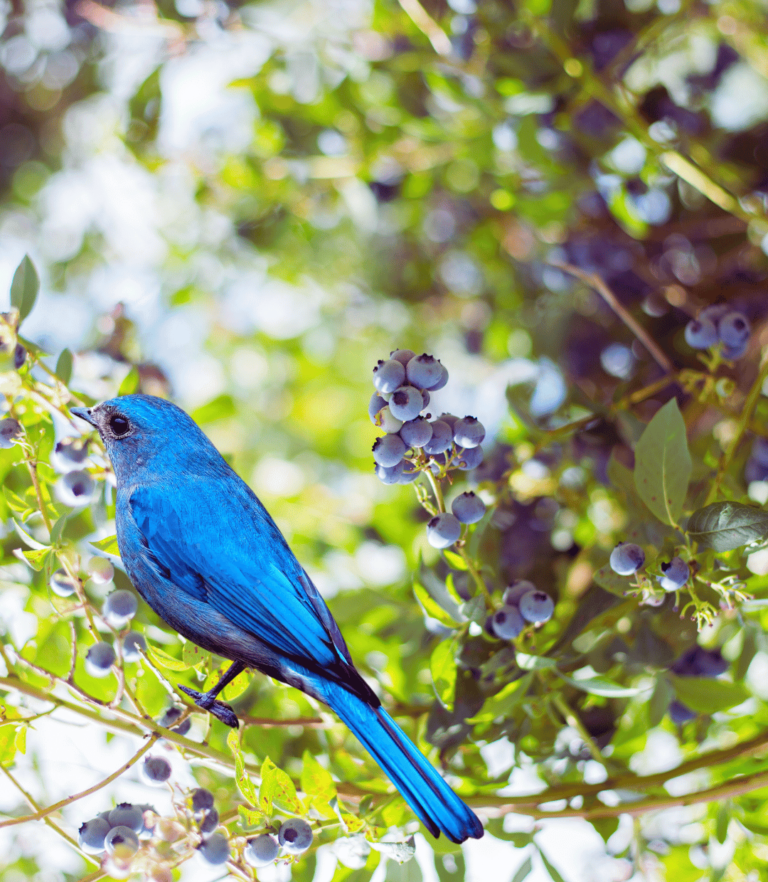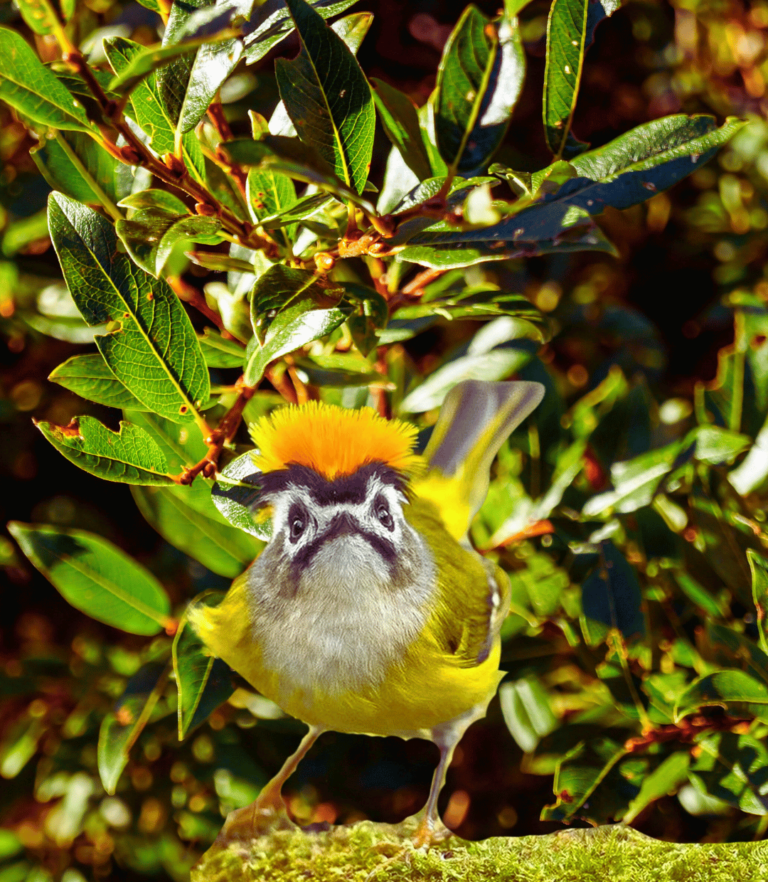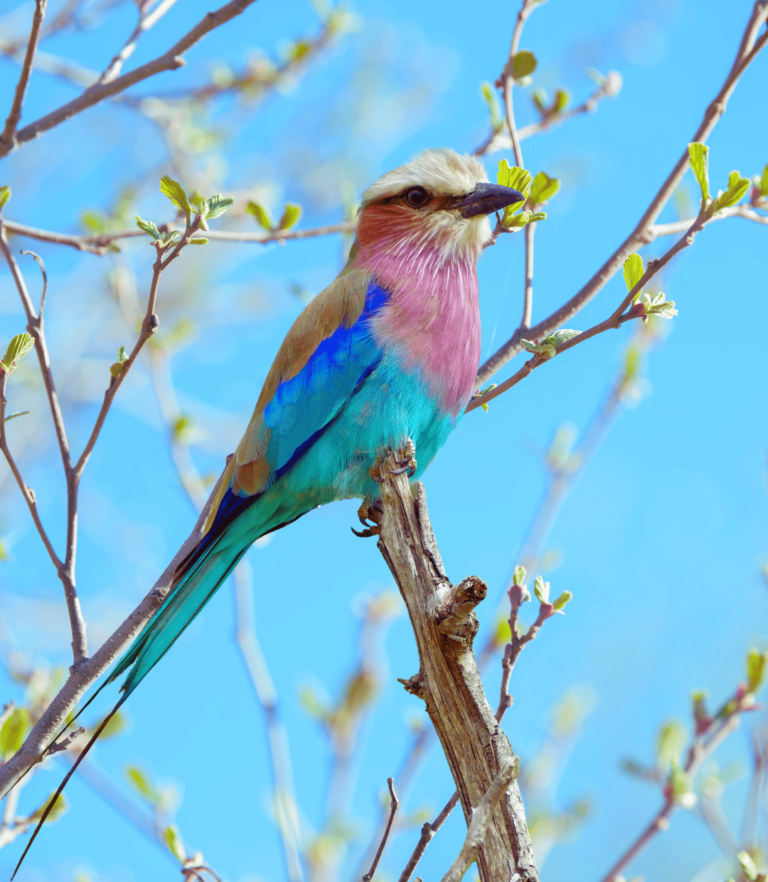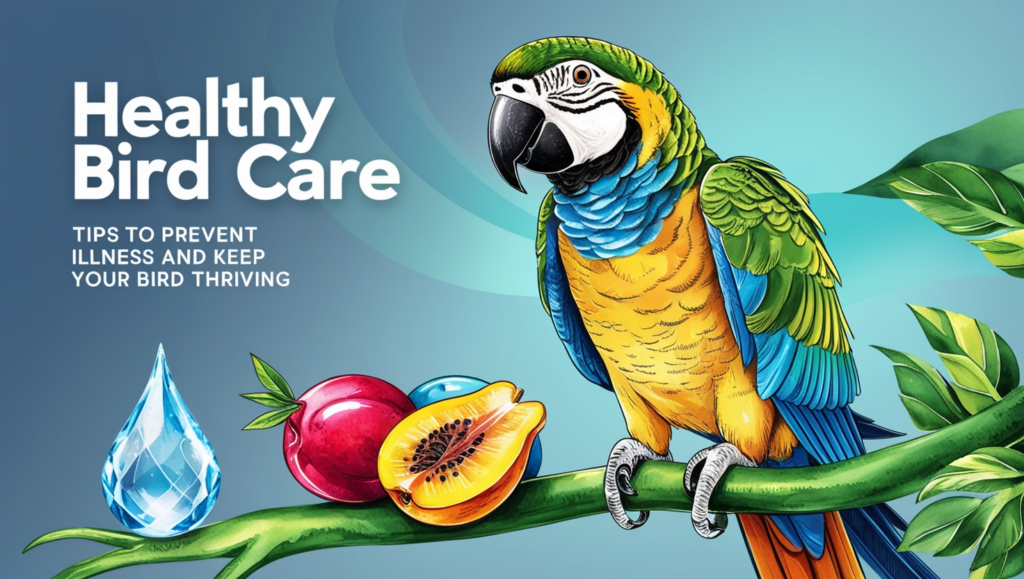
Keeping your pet bird healthy and happy requires a proactive approach to care. Birds are sensitive creatures, and maintaining their well-being involves proper diet, mental stimulation, hygiene, and regular vet visits. Preventing illness before it starts is key to ensuring your bird thrives for years to come. In this guide, we’ll share essential tips to help prevent illness and promote a healthy lifestyle for your feathered friend.
I. Provide a Balanced and Nutritious Diet
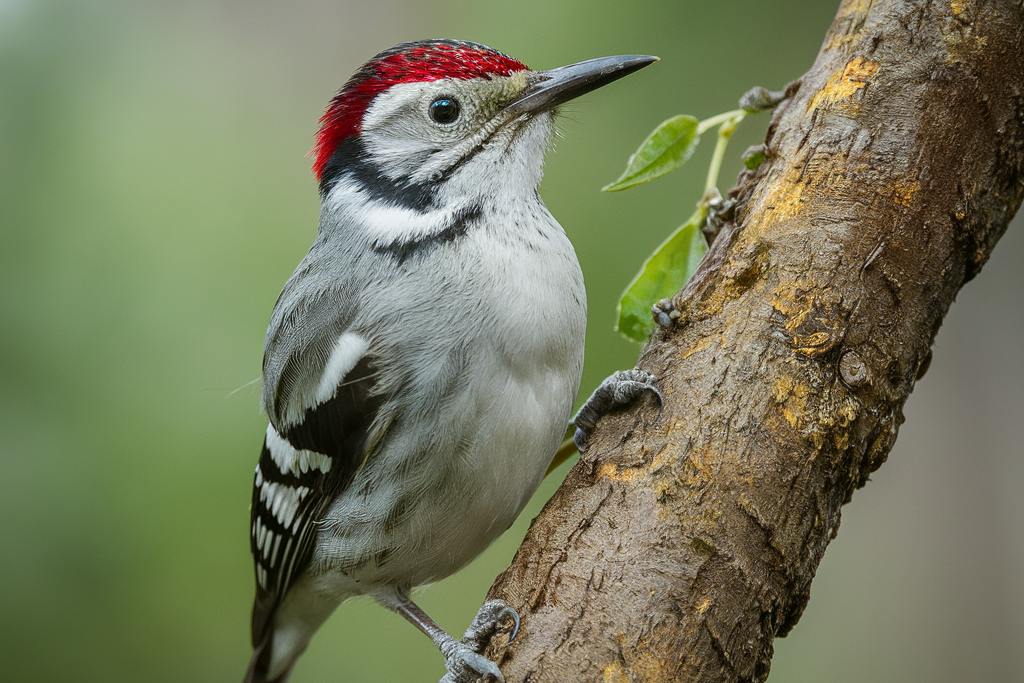
Providing a balanced and nutritious diet is one of the most crucial aspects of bird care. A well-rounded diet not only supports overall health but also helps prevent a range of illnesses, ensuring your bird thrives and enjoys a long, happy life. This article will guide you through the essentials of avian nutrition and how to create a diet plan that meets your bird’s specific needs.
Why a Balanced Diet is Essential for Birds
A balanced diet is fundamental to maintaining your bird’s health and preventing nutritional deficiencies. Just like in humans, a bird’s diet directly impacts their physical condition, energy levels, and overall well-being. Inadequate nutrition can lead to serious health issues such as obesity, vitamin deficiencies, and even life-threatening diseases.
Key Benefits of a Balanced Diet:
- Supports Immune Function: Essential nutrients boost your bird’s immune system, helping them resist infections and illnesses.
- Promotes Healthy Feather Growth: Proper nutrition contributes to vibrant, healthy feathers and a well-maintained plumage.
- Enhances Energy Levels: A diet rich in the right nutrients ensures your bird has the energy needed for daily activities and mental stimulation.
- Prevents Obesity: A balanced diet helps maintain a healthy weight, reducing the risk of obesity-related health problems.
Components of a Balanced Bird Diet
To provide a balanced diet for your bird, it’s important to include a variety of food sources that meet their specific nutritional needs. Here’s a breakdown of the key components:
- Pellets: The Nutritional Foundation
Pellets are often the cornerstone of a balanced avian diet. They are specially formulated to provide all the essential nutrients your bird needs in one convenient form.
- Choose Species-Specific Pellets: Different bird species have varying nutritional requirements. Select pellets that are tailored to your bird’s species and life stage (e.g., juvenile, adult, or senior).
- High-Quality Brands: Opt for reputable brands that use high-quality ingredients and avoid fillers and artificial additives.
- Fresh Fruits and Vegetables: Natural Nutrients
Fresh fruits and vegetables are crucial for providing vitamins, minerals, and antioxidants that are not always present in pellets.
- Variety is Key: Offer a variety of fruits and vegetables to ensure a wide range of nutrients. Favorites include carrots, leafy greens, apples, and berries.
- Preparation: Wash produce thoroughly and cut it into bite-sized pieces to make it easier for your bird to eat.
- Seeds and Nuts: Treats with Caution
Seeds and nuts can be nutrient-dense but should be offered in moderation due to their high fat content.
- Nutritional Value: Seeds and nuts provide healthy fats, proteins, and essential fatty acids.
- Moderation: Use seeds and nuts as occasional treats or supplements, not as the primary food source.
- Whole Grains: Fiber and Energy
Whole grains like quinoa, brown rice, and oats are excellent sources of fiber and energy.
- Benefits: Whole grains support healthy digestion and provide sustained energy.
- Serving: Cook grains thoroughly and offer them in small amounts to complement your bird’s main diet.
- Sprouts: Nutrient Powerhouses
Sprouts are rich in vitamins and enzymes that are beneficial for your bird’s health.
- Varieties: Offer different types of sprouts like alfalfa, mung bean, and broccoli sprouts.
- Preparation: Grow sprouts yourself or purchase them from a reputable source, ensuring they are fresh and free from contaminants.
- Calcium Sources: Essential for Bone Health
Calcium is crucial for maintaining strong bones and overall health.
- Sources: Offer calcium-rich foods such as cuttlebone, mineral blocks, and dark leafy greens.
- Supplementation: Consult with your veterinarian about whether additional calcium supplements are necessary for your bird.
Tips for Implementing a Balanced Diet
- Introduce Gradually: When transitioning to a new diet, introduce new foods gradually to avoid upsetting your bird’s digestive system.
- Monitor Preferences: Observe your bird’s food preferences and adjust their diet accordingly, ensuring they are getting the necessary nutrients.
- Avoid Toxic Foods: Steer clear of foods that are toxic to birds, such as chocolate, avocado, caffeine, and alcohol.
II. Ensure Clean, Fresh Water at All Times
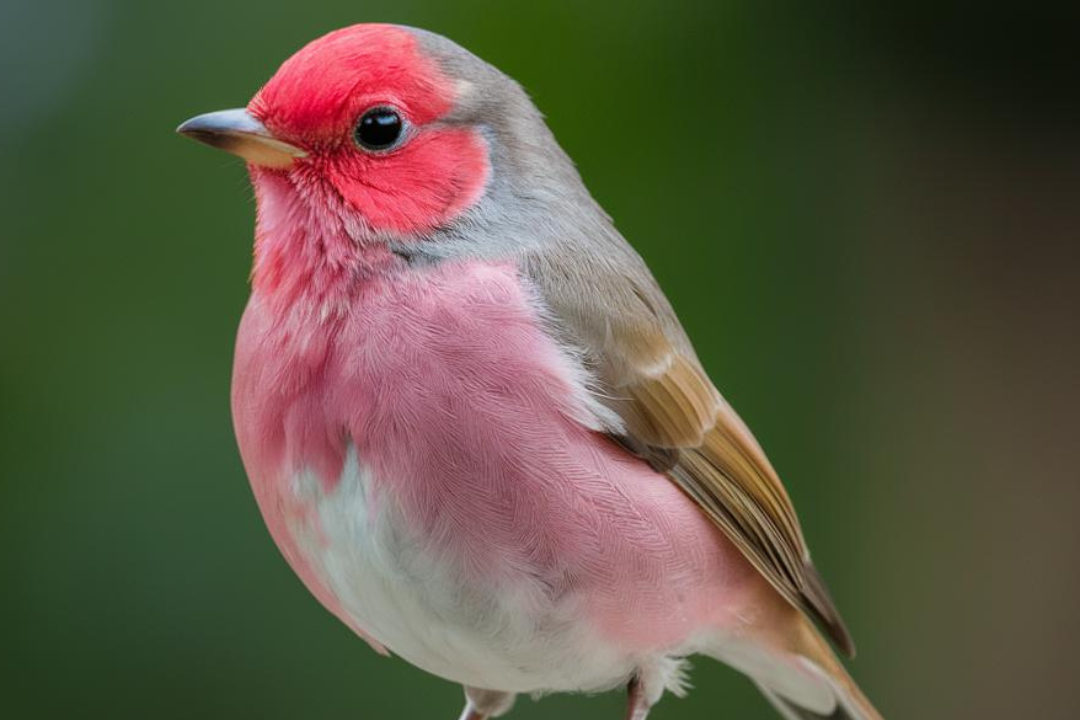
Maintaining clean, fresh water is a cornerstone of healthy bird care. Just like humans, birds require access to clean water to stay hydrated and healthy. Proper hydration is crucial for their overall well-being, and providing fresh water is an essential part of preventing illness and promoting longevity. In this article, we’ll explore why fresh water is so important for your bird’s health and offer practical tips to ensure your feathered friend always has access to clean water.
The Importance of Clean Water for Birds
Water is vital for birds’ health for several reasons:
- Hydration: Birds need constant access to fresh water to stay hydrated. Proper hydration supports essential bodily functions, including digestion, metabolism, and temperature regulation.
- Digestion: Water helps in the digestion and absorption of food. Without sufficient water, your bird may suffer from digestive issues, including constipation and discomfort.
- Feather Health: Adequate hydration contributes to healthy feather growth and maintenance. Well-hydrated birds are more likely to have vibrant, well-maintained plumage.
- Preventing Diseases: Clean water helps prevent the growth of harmful bacteria and parasites that can thrive in stagnant or contaminated water.
How to Provide Fresh Water for Your Bird
- Use a Clean Water Container
- Choose the Right Container: Select a water container that is easy to clean and refill. Options include bird water bottles, bowls, or dishes. Make sure the container is appropriately sized for your bird’s species and living space.
- Clean Regularly: Wash the water container daily with hot, soapy water to remove any residues and bacteria. Rinse thoroughly to ensure no soap residue remains. Additionally, disinfect the container weekly with a bird-safe cleaner.
- Change Water Frequently
- Daily Changes: Replace the water in your bird’s container at least once a day. This ensures that your bird always has access to fresh, clean water and reduces the risk of contamination.
- Monitor Water Levels: Check the water level throughout the day, especially in warmer weather or if you have multiple birds. Refill as needed to prevent the container from running dry.
- Avoid Contamination
- Prevent Access to Contaminants: Keep the water container away from potential sources of contamination, such as food dishes, perches, and areas where your bird may defecate.
- Protect from Spills: Use a water container with a design that minimizes spills and prevents your bird from accidentally soiling the water.
- Provide Clean Water During Travel
- Travel Containers: If you’re traveling with your bird, use a portable water container to ensure they have access to fresh water throughout the journey. Portable bird water bottles or travel dishes can be convenient for this purpose.
- Plan Stops: During long trips, plan stops to offer your bird fresh water and check their hydration levels.
- Consider Water Quality
- Filter Water: If your tap water is treated with chemicals or has impurities, consider using a water filter or offering bottled or distilled water. This helps ensure that your bird is drinking clean, safe water.
- Monitor Temperature: Avoid offering water that is too cold or too hot. Room temperature water is ideal for birds.
Signs of Dehydration to Watch For
Despite your best efforts, birds can sometimes become dehydrated. Watch for these signs of dehydration:
- Dull or Droopy Feathers: Dehydrated birds may have dull, ruffled feathers and appear lethargic.
- Sunken Eyes: Sunken eyes can be a sign of dehydration and require immediate attention.
- Excessive Thirst: If your bird is drinking significantly more water than usual, it may indicate a problem with their hydration or health.
III. Maintain Proper Hygiene
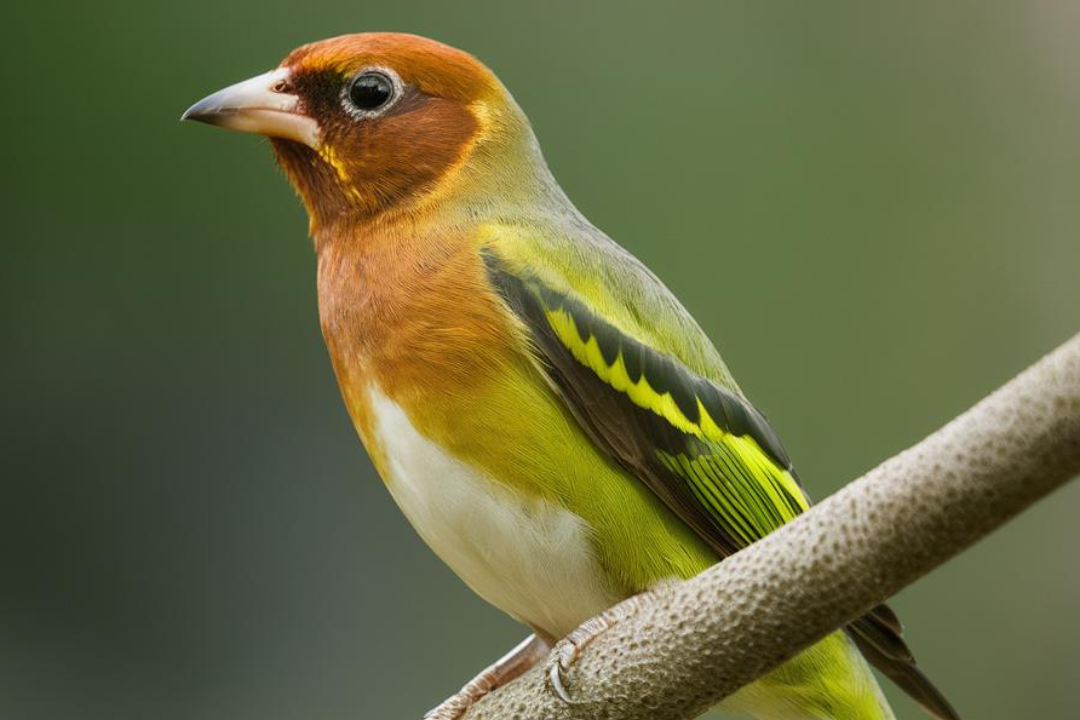
Maintaining proper hygiene is crucial for the health and well-being of your pet bird. Proper cleanliness not only ensures a healthy living environment but also plays a significant role in preventing illnesses and keeping your feathered friend thriving. In this article, we’ll discuss essential hygiene practices that every bird owner should follow to ensure their avian companion stays happy and healthy.
The Importance of Proper Hygiene for Birds
Proper hygiene is fundamental in preventing the spread of diseases, parasites, and bacteria. A clean environment helps maintain your bird’s health in several ways:
- Disease Prevention: Regular cleaning reduces the risk of bacterial, viral, and fungal infections that can affect your bird’s health. Dirty cages and equipment can harbor harmful pathogens.
- Parasite Control: Proper hygiene helps minimize the risk of parasites, such as mites and lice, which can cause discomfort and health issues in birds.
- Feather and Skin Health: Clean living conditions contribute to healthy feathers and skin. Excessive dirt and waste can lead to skin infections and feather issues.
- Overall Well-being: A clean environment promotes overall well-being and reduces stress for your bird. Birds are more comfortable and content in a hygienic space.
Essential Hygiene Practices for Bird Owners
- Clean the Cage Regularly
- Daily Spot Cleaning: Remove any droppings, leftover food, and debris from the cage floor and perches daily. This helps prevent the buildup of waste and keeps the environment clean.
- Weekly Deep Cleaning: Perform a thorough cleaning of the cage at least once a week. Disassemble the cage, wash all removable parts with hot, soapy water, and disinfect them with a bird-safe cleaner. Replace the cage liner or bedding as needed.
- Sanitize Food and Water Containers
- Daily Cleaning: Wash food and water containers daily to prevent the growth of bacteria and mold. Use hot, soapy water, and rinse thoroughly to remove any residues.
- Weekly Disinfection: Disinfect the containers weekly with a bird-safe disinfectant to eliminate any lingering germs.
- Maintain Perches and Toys
- Clean Perches: Scrub perches with hot, soapy water regularly to remove droppings and debris. Wooden perches can be scrubbed with a brush, while plastic or metal perches can be cleaned with a cloth.
- Disinfect Toys: Wash bird toys periodically with hot, soapy water and rinse thoroughly. Ensure that the toys are completely dry before returning them to the cage to prevent mold growth.
- Ensure Proper Ventilation
- Good Airflow: Ensure that your bird’s living space has adequate ventilation to prevent the buildup of stale air and moisture. Proper airflow helps reduce the risk of respiratory issues and keeps the environment fresh.
- Avoid Drafts: While good ventilation is important, avoid placing the cage in drafty areas or near sources of extreme temperature changes.
- Monitor and Address Hygiene Issues Promptly
- Inspect Regularly: Regularly check the cage and environment for signs of mold, pests, or excessive dirt. Address any issues immediately to prevent potential health problems.
- Consult a Vet: If you notice any unusual signs or symptoms in your bird, such as feather loss, skin infections, or behavioral changes, consult a veterinarian for advice and treatment.
Additional Tips for Maintaining Hygiene
- Avoid Toxic Cleaning Products: Use bird-safe cleaning products and avoid harsh chemicals that can be harmful to your bird. Look for cleaners specifically designed for bird environments.
- Keep the Area Around the Cage Clean: Ensure that the area surrounding your bird’s cage is clean and free of spilled food and waste. This helps maintain overall hygiene and reduces the risk of attracting pests.
- Provide a Bathing Area: Some birds enjoy bathing, which helps them keep their feathers clean and healthy. Provide a shallow dish of water or a birdbath to allow your bird to bathe as needed.
- Educate Yourself: Stay informed about best practices for bird care and hygiene. Regularly read up on new information and consult with avian veterinarians to ensure you are providing the best care possible.
IV. Promote Mental and Physical Stimulation
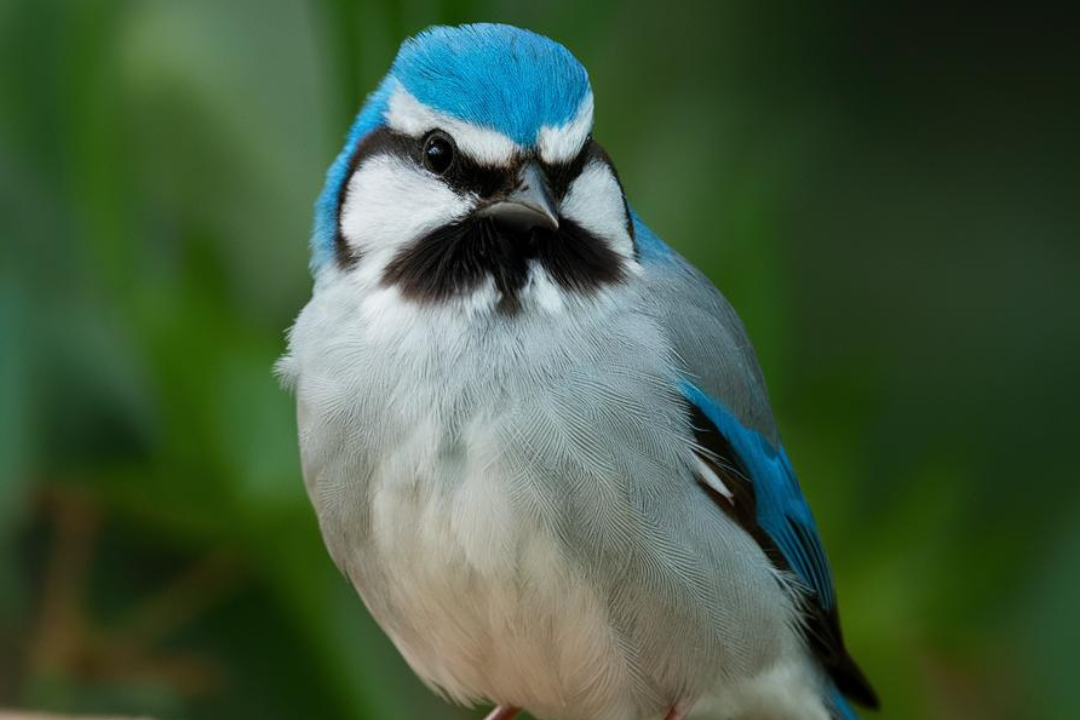
Ensuring that your pet bird remains mentally and physically stimulated is crucial for their overall health and well-being. Birds, like all animals, thrive on interaction and enrichment that keeps their minds and bodies active. This article provides valuable insights on how to promote mental and physical stimulation for your bird, helping to prevent illness and keep your feathered friend thriving.
Why Mental and Physical Stimulation is Important
Birds are highly intelligent and social creatures. Without adequate stimulation, they can become bored, stressed, and even develop behavioral issues. Providing enrichment helps:
- Prevent Behavioral Problems: Birds that are bored or unstimulated can exhibit undesirable behaviors such as feather plucking, excessive screaming, or aggression.
- Promote Physical Health: Regular physical activity is essential for maintaining a healthy weight and preventing obesity, which can lead to various health issues.
- Enhance Mental Well-being: Mental stimulation helps prevent cognitive decline and keeps your bird engaged, reducing stress and improving overall happiness.
- Foster Natural Behaviors: Enrichment activities mimic natural behaviors and environments, making your bird’s life more fulfilling and closer to their wild instincts.
Effective Ways to Promote Mental and Physical Stimulation
- Interactive Toys and Enrichment
- Variety of Toys: Offer a variety of toys that encourage different types of play, such as puzzle toys, foraging toys, and chew toys. Rotate toys regularly to keep your bird engaged and prevent boredom.
- Foraging Opportunities: Hide treats or food in foraging toys to stimulate your bird’s natural instincts to search and work for their food. This activity mimics their wild behavior and provides both mental and physical stimulation.
- Puzzle Toys: Provide toys that require problem-solving, such as those with hidden compartments or multiple steps to access a treat. These toys challenge your bird’s intellect and keep them occupied.
- Encourage Flight and Exercise
- Safe Flying Space: If possible, allow your bird to fly freely in a safe, bird-proofed room. Flying is excellent exercise and helps maintain muscle tone and cardiovascular health.
- Aviaries and Play Gyms: Set up an aviary or play gym with various perches, swings, and climbing structures. These setups provide opportunities for climbing, swinging, and exploring.
- Exercise Sessions: Engage in interactive play sessions with your bird using toys or training exercises. Encourage movement and physical activity through games and exercises.
- Social Interaction
- Daily Interaction: Spend quality time with your bird each day. Engage in activities such as talking, singing, or training sessions to strengthen your bond and provide social stimulation.
- Bird Buddies: If appropriate, consider providing companionship by introducing another bird. Social birds often benefit from the company of their own kind, which can enhance their mental well-being.
- Environmental Enrichment
- Change the Environment: Occasionally rearrange the layout of your bird’s cage or play area to provide new challenges and stimulation. Introduce new perches, toys, or climbing structures to keep the environment fresh and engaging.
- Natural Elements: Include elements that mimic a natural environment, such as branches, leaves, or safe plants. These additions provide sensory stimulation and encourage exploration.
- Training and Learning
- Training Sessions: Engage your bird in training sessions to teach new tricks or behaviors. Training is a great way to provide mental stimulation and strengthen your bond.
- Puzzle Challenges: Use interactive puzzles that require problem-solving skills. These challenges stimulate your bird’s intellect and keep them engaged.
- Mental Stimulation through Interaction
- Communication: Talk to your bird regularly and use different tones and sounds. Birds enjoy interacting with their owners and can learn to mimic words and sounds.
- Music and Sounds: Play soft music or natural sounds that your bird enjoys. This auditory stimulation can be soothing and engaging for your feathered friend.
Tips for Effective Stimulation
- Observe Your Bird: Pay attention to your bird’s preferences and needs. Some birds may prefer certain types of toys or activities, while others may enjoy different forms of stimulation.
- Avoid Overstimulation: While stimulation is important, avoid overwhelming your bird with too many toys or activities at once. Gradually introduce new elements and observe your bird’s response.
- Safety First: Ensure that all toys and enrichment items are safe for your bird. Avoid items with small parts that could be swallowed or cause injury.
V. Ensure Proper Sleep Patterns
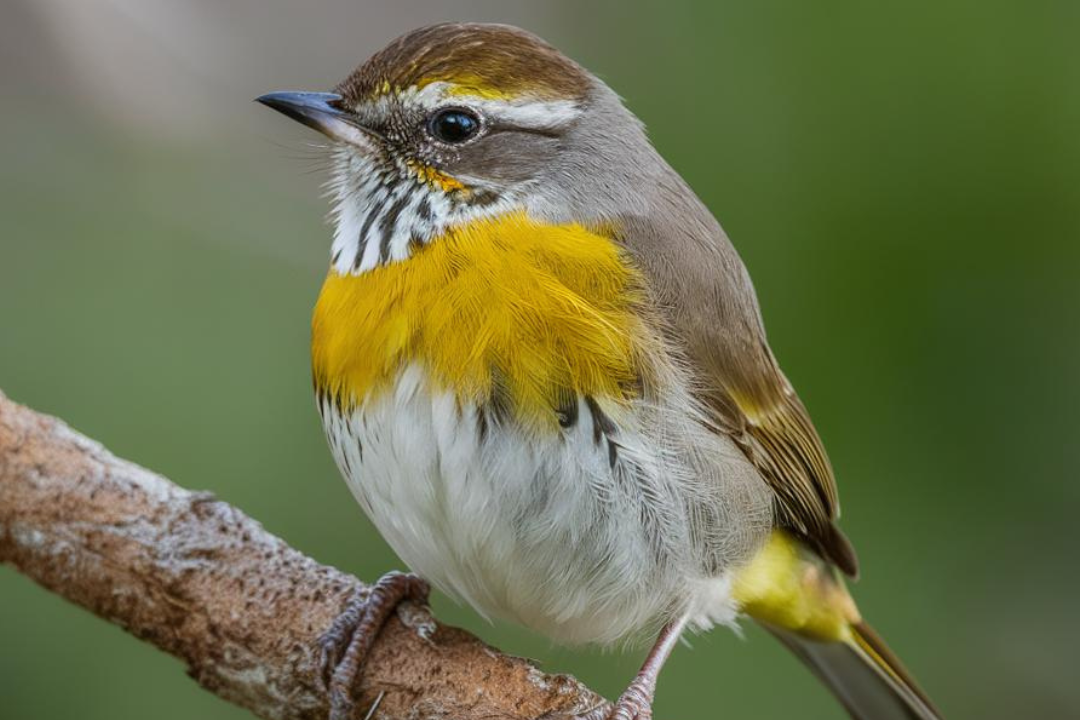
Ensuring that your pet bird maintains proper sleep patterns is crucial for their overall health and well-being. Just like humans, birds need adequate rest to stay healthy and happy. Proper sleep contributes to their physical health, mental stability, and longevity. This article will explore why sleep is essential for birds and how you can help your feathered friend achieve the best rest possible.
Why Proper Sleep is Vital for Birds
Birds, like all animals, require sufficient sleep to maintain their health and function optimally. Proper sleep helps:
- Boost Immune Function: Adequate rest is crucial for a strong immune system, helping birds fight off infections and diseases.
- Support Physical Health: Proper sleep supports overall physical health, including weight maintenance, cardiovascular health, and muscle recovery.
- Enhance Mental Health: Quality sleep helps reduce stress, anxiety, and behavioral problems, promoting a balanced and happy demeanor.
- Facilitate Natural Behaviors: Birds need a consistent sleep schedule to mimic their natural circadian rhythms, which helps maintain their biological clock.
How to Ensure Proper Sleep Patterns for Your Bird
- Establish a Consistent Sleep Schedule
- Set a Routine: Birds thrive on routine, so establish a consistent sleep schedule. Aim for 10-12 hours of sleep each night, similar to their natural day-night cycle.
- Nighttime Routine: Create a calming nighttime routine to signal to your bird that it’s time to wind down. Dim the lights and reduce noise to help them transition to sleep.
- Provide a Comfortable Sleeping Environment
- Cage Setup: Ensure that your bird’s cage is set up to facilitate comfortable sleep. Include perches that are positioned at a suitable height and are made of safe, comfortable materials.
- Dark and Quiet Space: Place the cage in a quiet, dark area during the night. Birds need darkness to signal their bodies that it’s time to rest. Use a cage cover if necessary to block out light and minimize disturbances.
- Maintain a Regular Day-Night Cycle
- Light Exposure: Mimic natural light cycles by exposing your bird to daylight during the day and darkness at night. Avoid sudden changes in lighting that could disrupt their sleep patterns.
- Sleep Environment: Ensure the sleep environment remains undisturbed. Avoid placing the cage in high-traffic areas or near loud appliances that could interrupt your bird’s sleep.
- Monitor Your Bird’s Sleep Habits
- Observe Sleep Patterns: Regularly observe your bird’s sleep patterns to ensure they are getting adequate rest. Look for signs of restlessness, excessive sleepiness, or difficulty settling down.
- Adjust as Needed: If you notice changes in your bird’s sleep habits, such as difficulty sleeping or waking frequently, consider adjustments to their sleep environment or schedule.
- Create a Relaxing Bedtime Routine
- Wind-Down Time: Implement a wind-down period before bedtime. Engage in calming activities, such as gentle talking or playing soothing music, to help your bird relax.
- Comfortable Perches: Provide comfortable perches for sleeping. Ensure they are appropriate for your bird’s size and allow them to rest comfortably throughout the night.
- Minimize Stress and Disruptions
- Limit Nighttime Disruptions: Minimize disruptions during the night, such as loud noises or sudden movements near the cage. A stable and quiet environment helps promote uninterrupted sleep.
- Manage Stress: Address any sources of stress or anxiety that may affect your bird’s sleep. This includes changes in their environment, interactions with other pets, or health issues.
- Provide Enrichment During the Day
- Daytime Activity: Ensure your bird is active and engaged during the day. Providing mental and physical stimulation through toys, interaction, and exercise helps them expend energy, making it easier for them to rest at night.
- Avoid Overstimulation: While it’s important to keep your bird active, avoid overstimulating them close to bedtime, as this can make it difficult for them to wind down.
VI. Monitor for Signs of Illness
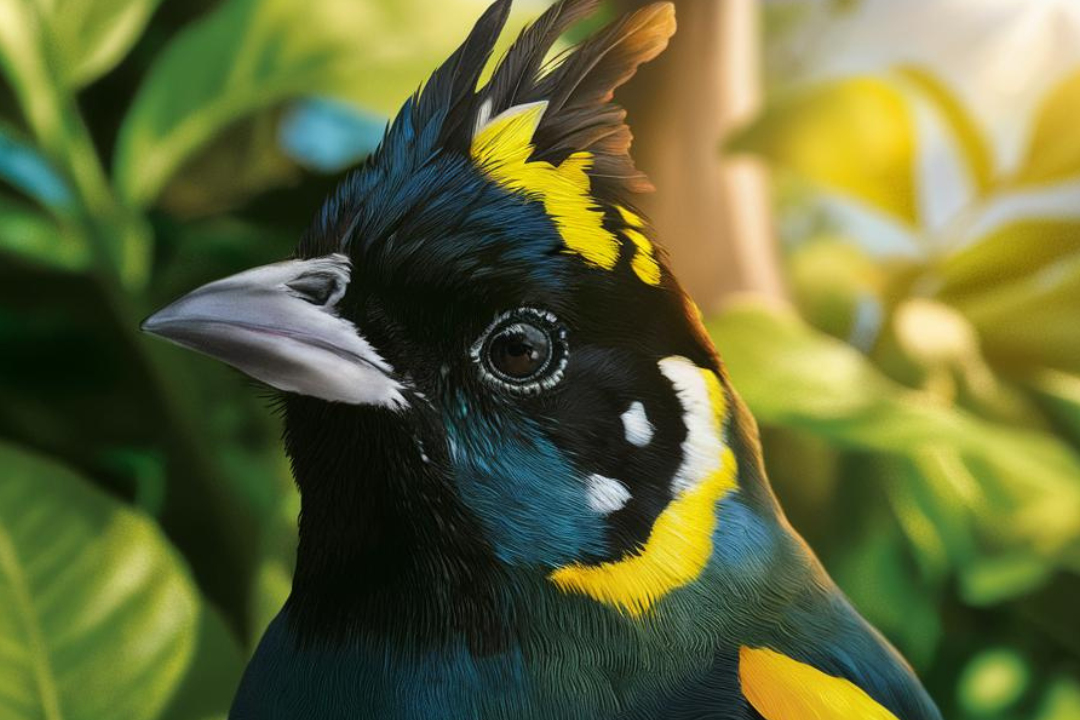
Regularly monitoring your bird for signs of illness is a critical aspect of maintaining their health and well-being. Birds are often adept at hiding discomfort or illness, making early detection essential for effective treatment and prevention. By being vigilant and proactive, you can ensure that your feathered friend remains healthy and thrives. This article will guide you on how to monitor your bird effectively and what signs to look for to keep your bird thriving.
Why Monitoring for Illness is Crucial
Monitoring your bird for signs of illness helps you:
- Detect Issues Early: Early detection of health problems allows for prompt treatment, increasing the chances of a successful recovery.
- Prevent Serious Conditions: Identifying and addressing minor symptoms can prevent them from developing into more serious conditions.
- Maintain Overall Health: Regular monitoring ensures that any potential health issues are managed before they impact your bird’s overall well-being.
- Enhance Quality of Life: Keeping an eye on your bird’s health helps ensure they remain comfortable and happy.
Key Signs to Watch For
- Changes in Appetite or Drinking Habits
- Decreased Appetite: A sudden loss of interest in food or a significant decrease in food consumption can indicate health issues. Look for signs of lethargy or unusual behavior during mealtime.
- Excessive Thirst: An increase in water consumption or signs of dehydration, such as dry beak or skin, can signal underlying health problems. Monitor how much your bird drinks and watch for any changes.
- Abnormal Droppings
- Consistency and Color: Changes in the consistency, color, or frequency of droppings can indicate digestive or kidney issues. Normal droppings should be well-formed and consistent in color.
- Presence of Blood or Mucus: Any blood, mucus, or unusual substances in droppings can be a sign of infection or internal issues. Seek veterinary attention if you observe these changes.
- Feather and Skin Issues
- Feather Plucking: Excessive feather plucking or damaged feathers may indicate stress, parasites, or skin conditions. Observe your bird’s plumage for any signs of damage or changes.
- Skin Irritations: Look for signs of redness, swelling, or lumps on the skin, which could signal skin infections or parasites. Healthy skin should be smooth and free of abnormalities.
- Behavioral Changes
- Lethargy: A sudden decrease in activity, lack of interest in play, or excessive sleeping can be signs of illness. Monitor your bird’s energy levels and behavior patterns.
- Aggression or Irritability: Changes in temperament, such as increased aggression or irritability, can indicate discomfort or health issues. Observe any behavioral shifts that may be unusual for your bird.
- Breathing Difficulties
- Labored Breathing: Signs of labored or noisy breathing, wheezing, or coughing can indicate respiratory problems. Healthy birds should breathe quietly and effortlessly.
- Nasal Discharge: Excessive nasal discharge or a blocked nostril can signal respiratory infections or irritants. Check for any discharge and monitor your bird’s breathing patterns.
- Changes in Weight
- Weight Loss: Significant weight loss or a noticeable decrease in body mass can be a sign of illness. Regularly weigh your bird to track any sudden changes.
- Weight Gain: Unexplained weight gain or bloating may indicate metabolic issues or other health problems. Monitor your bird’s weight and consult a vet if there are concerns.
- Swollen or Discolored Beak and Feet
- Swelling: Swelling or discoloration of the beak, feet, or legs can indicate infections or injuries. Check these areas regularly for any changes in appearance.
- Cracking or Discoloration: Changes in the beak’s color or texture can signal nutritional deficiencies or other health issues. Ensure your bird’s beak remains healthy and properly maintained.
Tips for Effective Monitoring
- Regular Check-Ups: Schedule regular veterinary check-ups to ensure your bird’s health is continuously monitored. A vet can provide professional evaluations and detect issues early.
- Daily Observations: Make a habit of observing your bird’s daily behavior, eating habits, and droppings. Consistent monitoring helps identify changes more easily.
- Record Keeping: Keep a health journal to track any changes in your bird’s behavior, diet, or physical appearance. This information can be valuable for your vet.
- Immediate Action: If you notice any of the signs mentioned above, seek veterinary advice promptly. Early intervention is key to managing and treating health issues effectively.
VII. Schedule Regular Veterinary Checkups
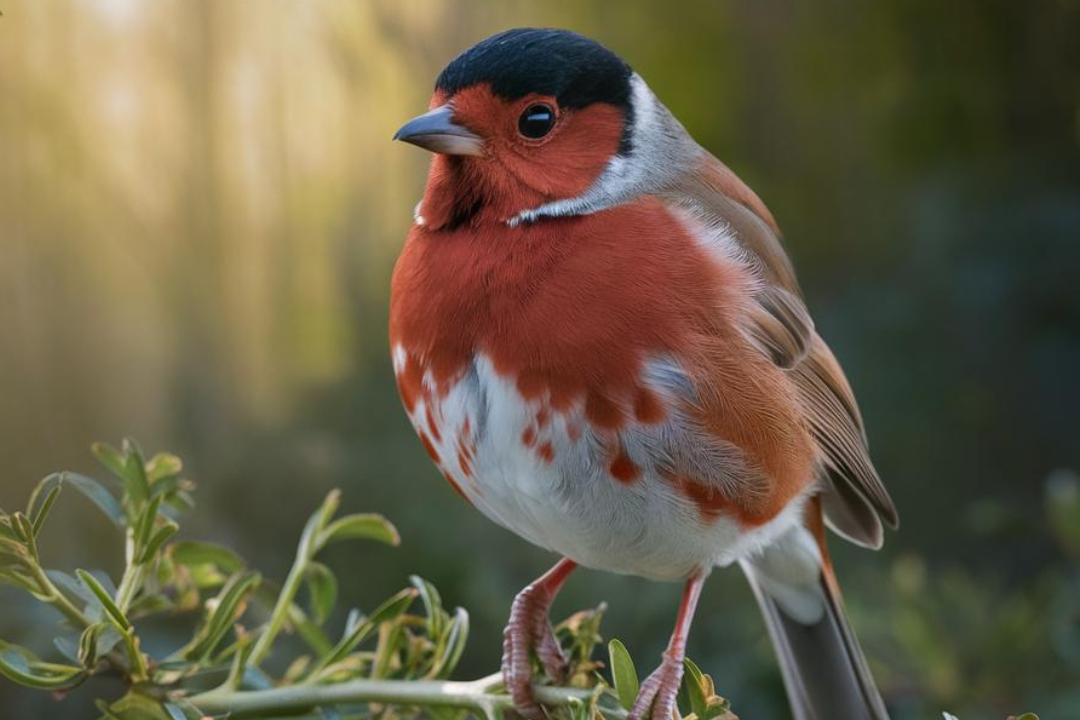
Maintaining your bird’s health involves more than just providing a balanced diet and a clean living environment. One of the most crucial aspects of bird care is scheduling regular veterinary checkups. These routine visits are essential for preventing illnesses, detecting health issues early, and ensuring your feathered friend lives a long, healthy life. This article explores why regular veterinary checkups are vital, what to expect during these visits, and how they contribute to your bird’s overall well-being.
Why Regular Veterinary Checkups Are Essential
- Early Detection of Health Issues
- Proactive Health Monitoring: Regular checkups allow veterinarians to detect health issues before they become severe. Birds can hide symptoms of illness, so routine exams help uncover problems that may not yet be visible.
- Preventive Measures: Vets can identify potential health risks and recommend preventive measures to avoid future problems, such as vaccinations or changes in diet.
- Tailored Health Advice
- Customized Care Plans: During checkups, veterinarians can offer personalized advice based on your bird’s specific needs. This may include dietary recommendations, behavioral tips, and environmental adjustments.
- Health Monitoring: Regular visits allow for consistent monitoring of your bird’s weight, growth, and overall health, ensuring any changes are promptly addressed.
- Vaccinations and Preventive Care
- Essential Vaccinations: Regular checkups ensure your bird receives necessary vaccinations to protect against common avian diseases. Preventive care helps safeguard your bird’s health and reduce the risk of illness.
- Parasite Control: Vets can check for and address any signs of parasites, such as mites or worms, which can significantly impact your bird’s health.
- Behavioral and Physical Assessments
- Behavioral Observations: Veterinarians assess your bird’s behavior during checkups to identify any signs of stress, anxiety, or behavioral disorders. Early intervention can improve your bird’s quality of life.
- Physical Examinations: Comprehensive physical exams allow vets to evaluate your bird’s beak, feathers, skin, and overall condition, identifying any abnormalities or signs of disease.
- Specialized Care for Unique Needs
- Senior Bird Care: Older birds often require more frequent checkups to manage age-related health issues. Regular vet visits help address conditions common in senior birds, such as arthritis or kidney disease.
- Special Requirements: Birds with specific health conditions or special needs may require tailored care plans, which can be managed through regular veterinary visits.
What to Expect During a Veterinary Checkup
- Initial Assessment
- Health History: The vet will review your bird’s health history, including any previous illnesses, treatments, and current symptoms.
- Physical Examination: A thorough physical examination is conducted, including checking the bird’s weight, feathers, beak, eyes, and overall condition.
- Diagnostic Tests
- Laboratory Tests: Depending on the examination, the vet may recommend blood tests, fecal exams, or other diagnostic procedures to assess your bird’s health.
- Imaging: X-rays or other imaging techniques may be used to evaluate internal health and detect any hidden issues.
- Treatment and Recommendations
- Treatment Plans: If any health issues are identified, the vet will discuss treatment options and create a plan to address them.
- Preventive Advice: The vet will provide recommendations for maintaining your bird’s health, including dietary adjustments, environmental changes, and behavioral enrichment.
- Follow-Up Visits
- Scheduling Future Checkups: Based on your bird’s health needs, the vet may recommend follow-up visits to monitor progress and ensure continued well-being.
- Ongoing Care: Regular checkups help track your bird’s health over time and adjust care plans as needed.
Tips for Scheduling and Preparing for Veterinary Checkups
- Regular Scheduling
- Annual Visits: Aim to schedule veterinary checkups at least once a year. Senior birds or those with specific health concerns may require more frequent visits.
- Proactive Booking: Book appointments in advance and keep a record of upcoming checkups to ensure timely visits.
- Preparation
- Document Health Changes: Keep track of any changes in your bird’s health, behavior, or diet, and provide this information to the vet during the visit.
- Transportation: Ensure your bird is safely transported to the vet in a secure carrier. Make the journey as stress-free as possible to avoid additional anxiety.
- Communication
- Discuss Concerns: Communicate any concerns or observations about your bird’s health to the vet during the checkup. Your insights can provide valuable information for diagnosis and treatment.
VIII. Create a Safe and Stress-Free Environment
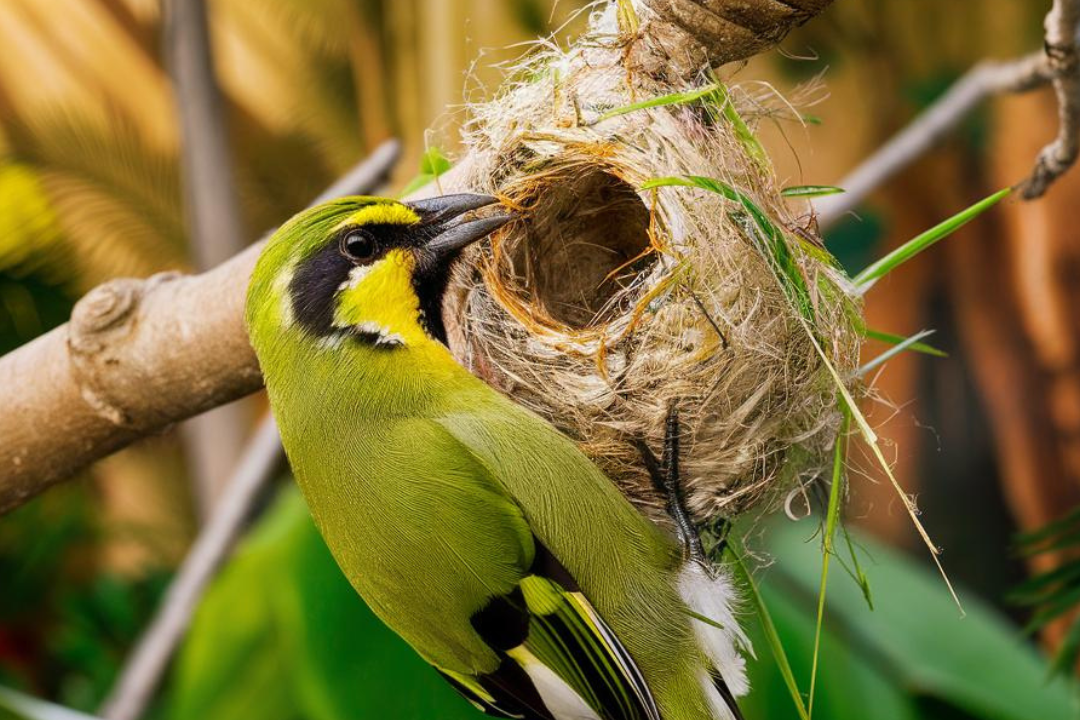
Creating a safe and stress-free environment is crucial for maintaining your bird’s health and well-being. Birds, like all pets, thrive in environments where they feel secure, comfortable, and free from stressors. By implementing the right strategies, you can help prevent illness and ensure your feathered friend remains happy and healthy. In this article, we’ll explore the essential steps to create an optimal living space for your bird, focusing on safety, comfort, and mental well-being.
Why a Safe and Stress-Free Environment Matters
- Reduces Stress and Anxiety
- Stress Reduction: A calm and secure environment helps minimize stress, which can impact your bird’s physical and emotional health. Chronic stress can lead to behavioral issues and weakened immune responses.
- Behavioral Stability: Birds that feel safe are less likely to exhibit stress-related behaviors such as feather plucking or excessive screaming.
- Promotes Physical Health
- Healthier Immune System: A stress-free environment supports a robust immune system, making your bird less susceptible to illnesses and infections.
- Better Overall Health: Birds that are comfortable and unstressed are more likely to eat well, exercise, and maintain a healthy weight.
- Encourages Natural Behaviors
- Mental Stimulation: A well-designed environment provides opportunities for mental stimulation and enrichment, encouraging natural behaviors like foraging, exploring, and playing.
- Social Interaction: Creating a social and interactive environment promotes bonding and emotional well-being.
Steps to Create a Safe and Stress-Free Environment for Your Bird
- Choose the Right Cage
- Size and Space: Ensure your bird’s cage is spacious enough for them to move around comfortably. The larger the cage, the better, as it allows for natural movements and activities.
- Bar Spacing: Select a cage with bar spacing appropriate for your bird’s size to prevent escapes and accidents. Small bar spacing is essential for smaller birds.
- Provide a Comfortable Habitat
- Bedding and Perches: Use safe, bird-friendly bedding and provide a variety of perches in different sizes and textures to promote foot health and comfort.
- Temperature and Drafts: Maintain a stable temperature and avoid placing the cage in drafty areas. Birds are sensitive to extreme temperatures and sudden changes.
- Minimize Stressors
- Noise Levels: Keep your bird’s environment quiet and avoid loud noises or sudden disturbances that can cause stress. Birds are sensitive to noise, which can affect their well-being.
- Other Pets: If you have other pets, ensure they do not have access to the bird’s cage or cause stress. Some pets may see birds as prey, leading to anxiety.
- Ensure Safety
- Toxic Substances: Remove any toxic substances from your bird’s environment, including plants, cleaning products, and certain types of cookware. Birds can be highly sensitive to fumes and chemicals.
- Cage Safety: Regularly check the cage for any signs of wear or damage that could pose a safety risk. Ensure all toys and accessories are safe and free from sharp edges.
- Encourage Enrichment
- Toys and Activities: Provide a variety of toys and activities to keep your bird entertained. Enrichment activities like puzzle toys, foraging toys, and swings can reduce boredom and encourage natural behaviors.
- Social Interaction: Spend quality time interacting with your bird. Regular socialization helps build trust and strengthens your bond, contributing to a happier and more relaxed bird.
- Maintain Cleanliness
- Regular Cleaning: Clean the cage and surrounding area regularly to prevent the buildup of waste, mold, and bacteria. A clean environment is essential for preventing diseases and maintaining overall health.
- Sanitary Practices: Use bird-safe cleaning products and avoid harsh chemicals that could harm your bird. Regularly wash food and water dishes to prevent contamination.
- Provide a Balanced Diet
- Healthy Nutrition: Ensure your bird has access to a balanced diet that meets their nutritional needs. A well-fed bird is less likely to experience stress related to hunger or poor health.
- Fresh Food and Water: Provide fresh food and clean water daily to keep your bird hydrated and well-nourished.
- Create a Routine
- Consistency: Establish a consistent daily routine for feeding, socializing, and cleaning. Birds thrive on routine, which helps them feel secure and reduces anxiety.
- Sleep Schedule: Ensure your bird has a regular sleep schedule with a quiet, dark environment during the night. Adequate rest is crucial for overall health and well-being.
IX. Avoid Exposure to Toxins
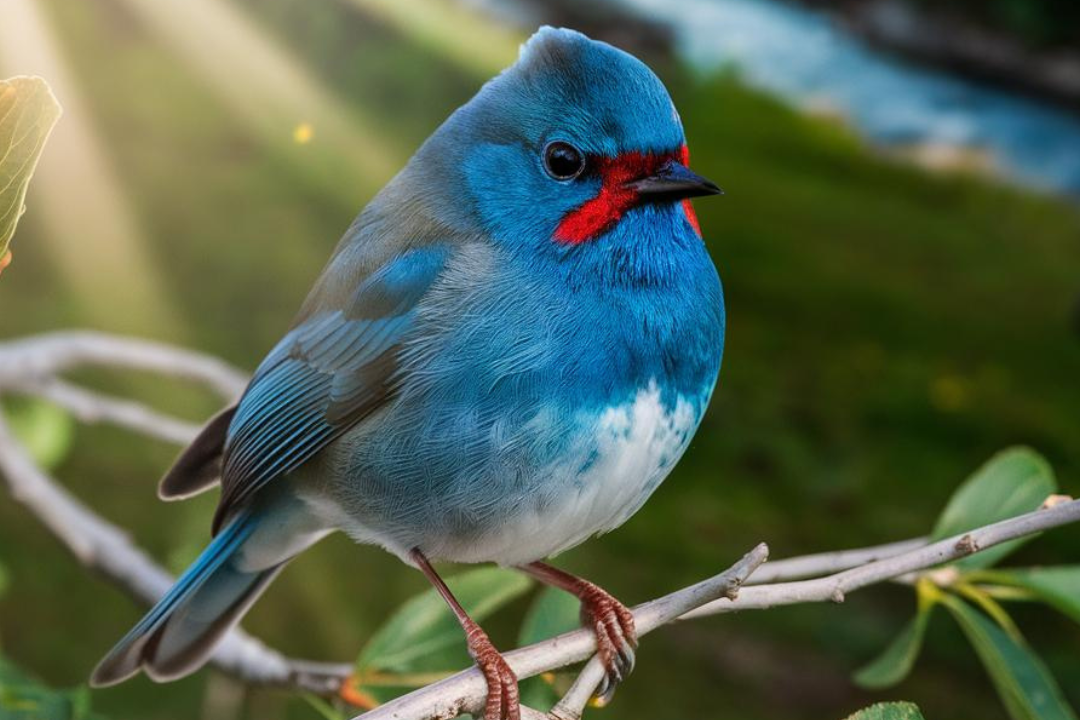
Ensuring your bird’s health involves many aspects, and one crucial area often overlooked is the prevention of toxin exposure. Birds are particularly sensitive to toxins, which can lead to serious health issues or even be life-threatening. In this article, we’ll discuss essential tips on how to avoid exposure to toxins to keep your feathered friend healthy and thriving.
Why Avoiding Toxins is Crucial for Your Bird’s Health
- Sensitive Respiratory Systems
- Respiratory Vulnerability: Birds have highly sensitive respiratory systems. Inhalation of toxic fumes or particles can cause respiratory distress, infections, or long-term damage.
- Signs of Distress: Symptoms of respiratory issues include wheezing, coughing, or labored breathing. Immediate action is crucial to prevent further harm.
- Toxic Food and Chemicals
- Dietary Toxins: Many common foods and chemicals are toxic to birds. Exposure to these can lead to gastrointestinal distress, poisoning, or organ damage.
- Avoiding Risks: Knowing which substances are harmful and how to prevent exposure is key to safeguarding your bird’s health.
- Long-Term Health Effects
- Chronic Conditions: Continuous exposure to toxins, even in small amounts, can lead to chronic health conditions such as liver damage or kidney failure.
- Quality of Life: Ensuring a toxin-free environment improves your bird’s overall quality of life and longevity.
Tips for Avoiding Exposure to Toxins
- Eliminate Toxic Substances
- Avoid Toxic Plants: Many household plants, such as philodendrons and poinsettias, are toxic to birds. Keep such plants out of reach or opt for bird-safe alternatives.
- Safe Cleaning Products: Use bird-safe cleaning products and avoid those containing ammonia, bleach, or other harsh chemicals. Ensure thorough ventilation after cleaning.
- Monitor Air Quality
- Ventilation: Keep your home well-ventilated, especially when using products that emit fumes. Open windows or use air purifiers to improve air quality.
- Avoid Aerosols: Do not use aerosol sprays, including air fresheners and hairsprays, near your bird. The chemicals in aerosols can be harmful when inhaled.
- Safe Cookware and Utensils
- Non-Stick Cookware: Avoid using non-stick cookware, as it can release fumes when overheated, which are highly toxic to birds. Opt for stainless steel or cast-iron alternatives.
- Avoiding Burns: Ensure that cooking appliances are used in areas where your bird cannot accidentally come into contact with hot surfaces or fumes.
- Safe Food Practices
- Non-Toxic Foods: Be aware of which foods are safe and unsafe for your bird. Avoid offering avocado, chocolate, caffeine, and certain seeds like apple seeds.
- Fresh and Clean: Always provide fresh food and clean water. Avoid using foods that have been exposed to pesticides or other chemicals.
- Regular Cage Maintenance
- Cleaning Protocol: Clean your bird’s cage and toys regularly to prevent the buildup of bacteria or mold. Use bird-safe cleaners and ensure all items are thoroughly rinsed.
- Inspect for Hazards: Regularly inspect the cage for any signs of damage or potential hazards, such as sharp edges or worn parts.
- Proper Storage of Chemicals
- Safe Storage: Store all household chemicals, including cleaning products and medications, in a secure location where your bird cannot access them.
- Avoid Exposure: Never use or store toxic chemicals near your bird’s cage or in areas where they can be exposed to fumes or spills.
- Educate Yourself on Toxic Substances
- Research: Stay informed about substances that can be harmful to birds. Resources from avian veterinarians or bird care organizations can provide valuable information.
- Consult Professionals: When in doubt about the safety of a product or food item, consult with your avian veterinarian.
- Create a Safe Environment
- Safe Perches and Toys: Choose toys and perches made from safe materials. Avoid those with small parts that can be chewed off and ingested.
- Bird-Friendly Products: Opt for bird-specific products that are designed with your pet’s safety in mind.
X. Educate Yourself Continuously
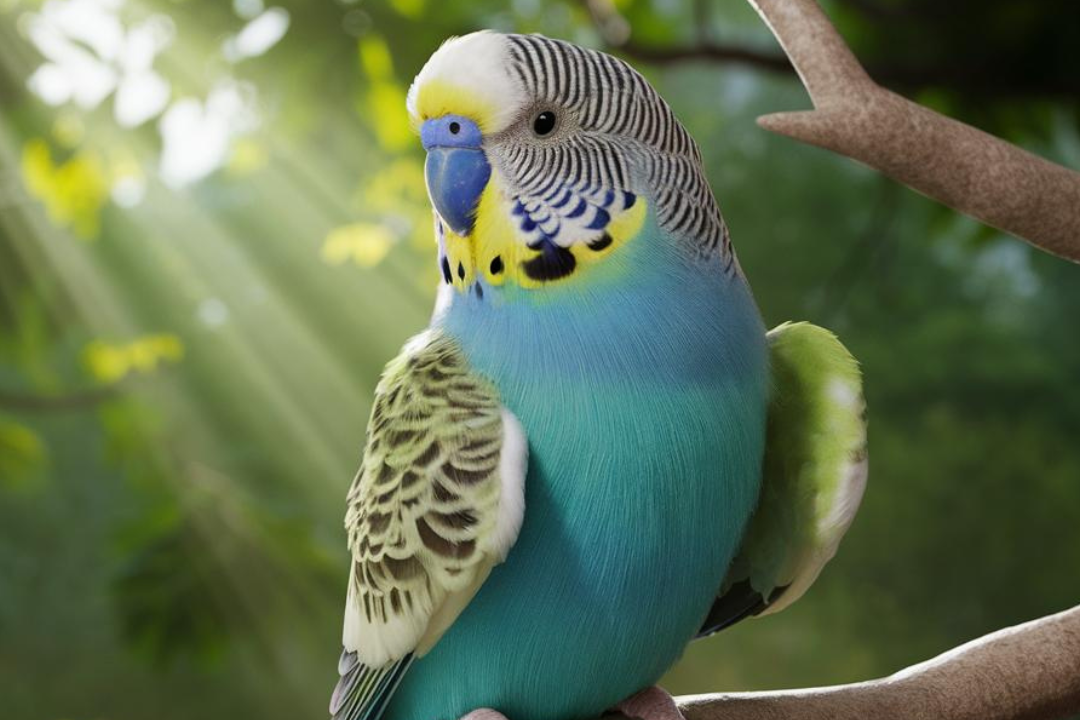
When it comes to providing the best care for your feathered friend, continuous education plays a vital role. Staying informed about the latest advancements in avian health, behavior, and nutrition is crucial for preventing illness and ensuring your bird leads a happy and healthy life. In this article, we’ll explore why ongoing education is essential and how you can stay up-to-date with the best practices in bird care.
The Importance of Continuous Education in Bird Care
- Evolving Knowledge
- Advancements in Research: The field of avian health is constantly evolving. New research findings and medical advancements can provide insights into better care practices and treatments for common ailments.
- Updated Guidelines: Staying current with the latest care guidelines ensures that you are following best practices and utilizing the most effective methods to maintain your bird’s health.
- Understanding Behavioral Changes
- Behavioral Insights: Birds communicate their health status and emotional well-being through their behavior. Educating yourself about behavioral changes helps you recognize signs of distress or illness early.
- Effective Solutions: Knowledge about bird behavior allows you to address issues promptly and implement appropriate solutions to improve your bird’s quality of life.
- Preventing Common Health Issues
- Health Awareness: Being informed about common health problems and their prevention strategies helps you take proactive measures to avoid potential issues.
- Early Intervention: Understanding symptoms and early warning signs enables you to seek timely veterinary care, which can prevent minor issues from becoming serious conditions.
How to Continuously Educate Yourself About Bird Care
- Consult Avian Veterinarians
- Professional Advice: Regular check-ups with an avian veterinarian provide you with expert advice on maintaining your bird’s health and addressing any concerns.
- Ask Questions: Don’t hesitate to ask your veterinarian about the latest advancements, recommended practices, or any specific issues you may encounter with your bird.
- Read Avian Care Books and Articles
- Books: Invest in reputable books written by avian experts that cover various aspects of bird care, from health and nutrition to behavior and training.
- Articles: Stay informed by reading articles from trusted sources, including veterinary journals, bird care websites, and avian organizations.
- Join Bird Care Communities
- Online Forums: Participate in online forums and social media groups dedicated to bird care. These platforms allow you to connect with other bird owners, share experiences, and learn from their insights.
- Local Clubs: Join local bird clubs or organizations where you can attend meetings, workshops, and seminars to gain knowledge from experienced bird enthusiasts.
- Attend Workshops and Seminars
- Educational Events: Look for workshops, webinars, and seminars offered by avian veterinarians, bird care organizations, or pet stores. These events provide valuable information on various aspects of bird care.
- Networking Opportunities: Attending these events allows you to network with professionals and other bird owners, expanding your knowledge and resources.
- Utilize Online Resources
- Websites and Blogs: Explore reputable websites and blogs dedicated to avian health and care. These resources often feature articles, videos, and tutorials on a wide range of topics.
- Educational Videos: Watch educational videos on platforms like YouTube that cover bird care tips, health advice, and training techniques.
- Stay Informed About Nutrition
- Nutritional Guidelines: Keep up-to-date with the latest recommendations on bird nutrition, including the best diets, supplements, and foods to avoid.
- Dietary Trends: Educate yourself about new dietary trends and how they can impact your bird’s health and well-being.
- Understand Behavioral Trends
- Behavioral Research: Stay informed about research on bird behavior and training techniques. Understanding these trends can help you address behavioral issues and improve your bird’s overall happiness.
- Training Methods: Learn about positive reinforcement training methods and how they can enhance your bird’s behavior and interactions.
- Read Testimonials and Case Studies
- Success Stories: Review testimonials and case studies from other bird owners who have successfully managed health issues or improved their bird’s quality of life.
- Lessons Learned: Analyze these experiences to gain insights into effective care strategies and potential challenges.

